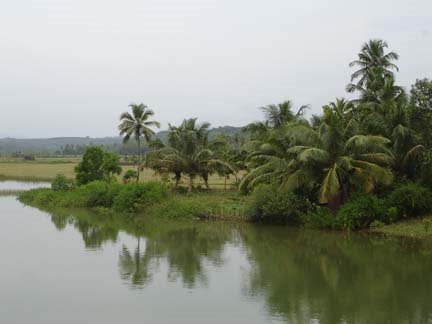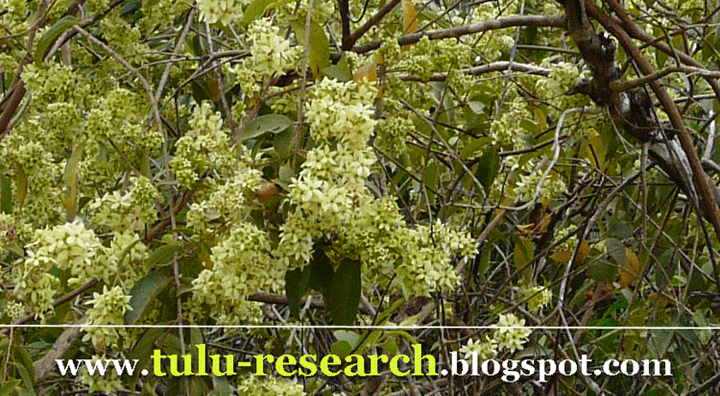Few years ago, elderly people used to scold the younger lazy ones in TuLu, something like: “Nikk dada muTTu-kaDi aatini?” (Roughly translated, it means what bad thing has affected to you?)What is the meaning and origin of this word-‘muTTukaDi’ ?
Tulu nighantu
The ‘TuLu nighanTu’ describes (page 2617) the noun ‘muTTukaDi’ as-(a) a critical condition (b) urgency or critical state or (c) a narrow path.
Even though the explanation holds good to understand the usage cited above, it does not clearly explains the usage of the words ‘muTTu’ and ‘kaDi’ in the idiom.
The word muTTu has several shades of meanings in Tulu as given in the ‘TuLu nighanTu’: (1) reach (2) touch (3 ) commence (4) pile up (5 )kick (6) fight (7) bite (8) terminate (9) stool (10) menses (11) prohibition (12) sandals (13) stairs (14) footprint (15) unfavorable conditions.
The word ‘kaDi’ generally means the narrow entrance. These words generally do not explain the origin or meaning of the cited word.
An Old Kannada word
However, the word muTTukaDi is found in ‘VaDDaaradhane’, the first known text in old Kannada language composed by Shivakotyachar ca.930CE.Dr. D. L. Narasimhachar, an eminent Kannada scholar has explained the meaning of the word in Notes to the published text. The old Kannada word ‘muTTukaDi’ is equal to ‘muTTugolu’(=to confiscate) in modern Kannada usage. In the earlier regal days of monarchy, it was a practice to confiscate all the entire property of the person who has disobeyed the laws of the State. The word ‘muTTu’ means all movable properties. The representatives of the King used to carry a pole or stick (‘gaDe’ or ‘kaDe’ or ‘gaDi’) that is used to officially declare that all properties belonging to the convicted person are confiscated by the State. Therefore a person who has been ordered to be ‘muTTukaDe’ is rendered utterly penniless and poor.
The old Kannada word ‘muTTukaDe’ has been in use in Tulu language and culture probably since ancient days (Vaddaradhane, 10th Century CE), as a consequence of transactions between the Tulu and the Kannada people.
®
Subscribe to:
Post Comments (Atom)
Blog Archive
Books for Reference
- A Comparative Study of Tulu Dialects By Dr. Padmanabha Kekunnaya. Govinda Pai Reserach Centre, UDupi. 1994
- Koti Chennaya: Janapadiya Adhyayana. By Dr. Vamana Nandavar. Hemanshu Prakashana ,Mangalore.2001.
- Male kudiyaru. Dr B. A.Viveka Rai and D.Yadupathi Gowda, Mangalore University,1996.
- Mogaveera Samskriti By Venkataraja Punimchattaya. Karnataka Sahitya Academy.1993.
- Mugeraru:Jananga Janapada Adhyayana. By Dr Abhaya Kumar Kaukradi.Kannada & Culture Directorate,Bangalore & Karnataka Tulu Academy, Mangalore,1997.
- Puttubalakeya Pad-danagalu. Ed: Dr B.A.Viveka Rai,Yadupati Gowda and Rajashri, Sri Dharmasthala Manjunatheswara Tulu Peeta. Mangalore University.2004
- Se'erige. Ed:Dr K.Chinnapa Gowda.Madipu Prakashana,Mangalagangotri,2000.
- Studies in Tuluva History and Culture.by Dr P Gururaja Bhat (1975).Milagres College,Kallinapur,Udupi.
- Taulava Sanskriti by Dr.B.A.Viveka Rai, Sahyadri Prakashana,Mysore 1977
- TuLu naaDu-nuDi By Dr.PalthaDi Ramakrishna Achar, Puttur.
- TuLu NighanTu. (Editor in Chief: Dr U.P.Upadhyaya, Govinda Pai Research Centre,Udupi. Six volumes. 1988 to 1997
- Tulu Patero-A Philology & Grammar of Tulu Language by Budhananda Shivalli.2004.Mandira Prakashana Mangalore. p.317. (The book is in Tulu Language using Kannada script)
- TuLunadina ShasanagaLa Sanskritika Adhyayana. By Shaila T. Verma (2002) Jnanodaya Prakashana,Bangalore, p.304.(Kannada)
- Tuluvala Baliyendre. Compiled by N.A.Sheenappa Hegde,Polali,Sri Devi Prakashana,Parkala,1929/1999
* Landscape images *
A Coastal estuary

Holegadde near Honavar,Uttara Kannada dist, Karnataka
Copy? Right - but kindly remember to acknowledge!
" tulu-research.blogspot." ತುಳು ರಿಸರ್ಚ್. ಬ್ಲಾಗ್ಸ್ಪಾಟ್. ಇನ್

Have a nice day !

No comments:
Post a Comment